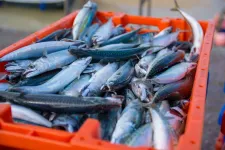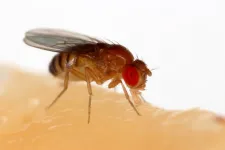New biomaterials can be 'fine-tuned' for medical applications
2021-01-19
(Press-News.org) Researchers in the UK and the United States have succeeded in 'fine tuning' a new thermoplastic biomaterial to enable both the rate at which it degrades in the body and its mechanical properties to be controlled independently.
The material, a type of polyester, has been designed for use in soft tissue repair or flexible bioelectronics by a team at the University of Birmingham in the UK and Duke University in the US.
Materials that successfully replicate the necessary elasticity and strength of biological tissues but which also biodegrade over an appropriate timescale are extremely difficult to engineer. This is because the chemistry used to produce a material's mechanical properties will also typically govern the rate at which it degrades.
In a new advance, the team has now shown how the addition of succinic acid - a product found naturally within the body - can be used to control the degradation rate.
In a new study, published in Nature Communications, researchers showed how the polyester biomaterial degrades gradually over a period of four months, with healthy tissues growing into and eventually replacing the implant. Tests in rats were also carried out to confirm the material's biocompatibility and safety.
By varying the amounts of succinic acid the team could control the rate at which water penetrates the material and hence the degradation speed. Usually, the structural changes that increase degradation speed would cause a loss of strength, but this material has been designed with specific stereochemistry that mimics natural rubber and allow its mechanical properties to be finely controlled. This means any loss of strength can be compensated for by making suitable stereochemical adjustments. This is a significant advance that has so far not been achieved in any other degradable biomaterial.
Co-author of the study Professor Andrew Dove explains: "Biological tissues are complex with varying elastic properties. Efforts to produce synthetic replacements that have the right physical characteristics and that can also degrade in the body have been ongoing for decades.
"Part of the challenge is that a 'one-size-fits-all' approach doesn't work. Our research opens up the possibility of engineering biological implants with properties that can be fine-tuned for each specific application."
Professor Matthew Becker, who holds dual appointments in chemistry and mechanical engineering and materials science at Duke, notes that the biomaterials and regenerative medicine communities have been severely limited to a few materials which lack the diversity of properties reported in this study. "The materials we have developed offer a real advance in the ongoing search for new biomaterials. The tunable nature of the material makes it suitable for a range of different applications, from replacement bone to vascular stents to wearable electronics. Additional work to prove the biocompatibility of the material and its use in more advanced demonstration is ongoing."
INFORMATION:
The research was funded by the National Science Foundation, the John S. and James L. Knight Foundation, the European Research Foundation and the National Health and Medical Research Council of Australia.
The technology is the subject of international patent applications filed by the University of Warwick and Akron University.
ELSE PRESS RELEASES FROM THIS DATE:
2021-01-19
DANVILLE, Pa. - A team of Geisinger researchers has identified a common genetic variant as a risk factor for stroke, especially in patients older than 65.
Cerebral small vessel disease (SVD) causes about a quarter of ischemic strokes worldwide and is the most common cause of vascular dementia. SVD can manifest as lesions on the brain, which typically appear on brain scan images. SVD is commonly associated with aging and hypertension, but a minority of cases are caused by cysteine altering variants in the NOTCH3 gene. Approximately 1 in 300 people have this type of gene variant. A rare hereditary condition known as cerebral autosomal dominant arteriopathy with subcortical infarcts and leukoencephalopathy, or CADASIL, which is caused by this gene variant, has been associated with ...
2021-01-19
Fear of losing your job, worrying about you or a loved one getting sick, and online meetups with family and friends you have not seen for months. The COVID-19 lockdown has completely changed everyday life for most people around the world. Physical distancing is the new normal and an extremely important tool in the fight against the pandemic.
However, the effects of the lockdown on mental health are alarming - especially for young people under 30 and people with preexisting mental health issues. This is the conclusion of a new study from the University ...
2021-01-19
Consumers of purchased foods have no way of ascertaining the quality and safety of the food that existing distribution systems deliver to their plates. Unfortunately, inappropriate refrigeration can sometimes lead to food spoilage, which is often difficult to detect. Such is the case for mackerel fish, which readily develop harmful levels of a substance called histamine when left at room temperature for too long. Histamine is neurotoxic and can trigger severe allergic reactions, including rashes, vomiting, and diarrhea. Because spoiled fish can sometimes look and smell completely normal, it is important to accurately quantify ...
2021-01-19
Scientists are searching for lithium technology alternatives in the face of the surging demand for lithium-ion batteries and limited lithium reserves. Russian researchers from Skoltech, D. Mendeleev University, and the Institute of Problems of Chemical Physics of RAS have synthesized and tested new polymer-based cathode materials for lithium dual-ion batteries. The tests showed that the new cathodes withstand up to 25,000 operating cycles and charge in a matter of seconds, thus outperforming lithium-ion batteries. The cathodes can also be used to produce less expensive potassium ...
2021-01-19
Having a choice of foods may accelerate aging and shorten the lifespan of fruit flies, according to a study published today in the open-access eLife journal.
While early experiments have shown that calorie restriction can extend lifespan, the current study adds to the growing body of evidence that suggests other diet characteristics besides calories may also influence aging and lead to earlier death.
"It has been recognised for nearly a century that diet modulates aging," says first author Yang Lyu, Postdoctoral Fellow at the Department of Molecular & Integrative Physiology, University of Michigan Medical School, Ann Arbor, US. "For our study, we wanted to see if having a choice of foods affects metabolism and lifespan in the fruit fly Drosophila melanogaster."
Lyu ...
2021-01-19
LEBANON, NH - A joint team of researchers from Radiation Oncology at Dartmouth's and Dartmouth-Hitchcock's Norris Cotton Cancer Center (NCCC), Dartmouth Engineering, and Dartmouth-Hitchcock's Department of Surgery have developed a method to convert a standard linear accelerator (LINAC), used for delivery of radiation therapy cancer treatment, to a FLASH ultra-high-dose rate radiation therapy beam. The work, entitled "Electron FLASH Delivery at Treatment Room Isocenter for Efficient Reversible Conversion of a Clinical LINAC," is newly published online in the International Journal of Radiation Oncology, Biology & Physics.
The exceptionally high dose rate is 3,000 times higher than normal therapy treatment (300 Gray per second vs. 0.1 Gray per second, Gray being a standard ...
2021-01-19
Skoltech scientists and their colleagues from the Russian Quantum Center revealed a significant role of nuclear quantum effects in the polarization of alcohol in an external electric field. Their research findings are published in The Journal of Physical Chemistry.
Molecular liquids, such as water or alcohols, are known to be polar. Polarity results from the charge separation mechanism, the microscopic description of which still bears some open questions. In fact, the basic description of the polarization rests on a hundred-years-old concept: the dielectric polarization is connected to the molecular dipole moment due to their hydroxyl ...
2021-01-19
WASHINGTON, Jan. 19, 2020 -- What makes breast milk so good for babies? In this episode of Reactions, our host, Sam, chats with chemist Steven Townsend, Ph.D., who's trying to figure out which sugar molecules in breast milk make it so unique and difficult to mimic: https://youtu.be/o4_npLDyyUw.
INFORMATION:
Reactions is a video series produced by the American Chemical Society and PBS Digital Studios. Subscribe to Reactions at http://bit.ly/ACSReactions and follow us on Twitter @ACSReactions.
The American Chemical Society (ACS) is a nonprofit organization chartered by the U.S. Congress. ACS' mission is to advance the broader chemistry enterprise and its practitioners for the benefit of Earth and its people. The Society is a global leader in providing access ...
2021-01-19
Two international studies confirm that for the majority of patients with respiratory infections who lose the sense of smell, this is due to COVID-19. The disease also often results in both loss of taste and the other senses in the mouth. A researcher from Aarhus University has contributed to the new results.
If you have had COVID-19, then forget about enjoying the smell of freshly made coffee. At any rate, two major international studies document that there is frequently a loss of smell and that this often lasts for a long time in cases of COVID-19
Alexander Wieck Fjaeldstad, is associate professor in olfaction and gustation at Aarhus University, and is behind the Danish part of the study.
The study ...
2021-01-19
In a large-scale study of Danish children and young people, researchers from Aarhus University have for the first time found genetic variants that increase the risk of nocturnal enuresis - commonly known as bedwetting or nighttime incontinence. The findings provide completely new insights into the processes in the body causing this widespread phenomenon.
Researchers have long known that nighttime incontinence is a highly heritable condition. Children who wet the bed at night often have siblings or parents who either suffer from or have suffered from the same condition. ...
LAST 30 PRESS RELEASES:
[Press-News.org] New biomaterials can be 'fine-tuned' for medical applications



